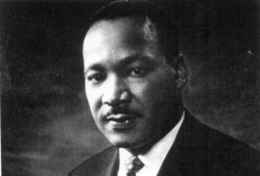On April 7, 1968, Washington residents mourn the death of civil rights leader Rev. Martin Luther King Jr. (1929-1968), who was assassinated in Memphis, Tennessee, on April 4, 1968.
The Rev. Martin Luther King Jr., a Baptist minister from Montgomery, Alabama, headed the Southern Christian Leadership Council and was the nation's most visible leader in the civil rights movement of the 1950s and 1960s. He advocated nonviolent direct action as a tactic and a philosophy in the struggle for social justice. He was shot and killed by a sniper in Memphis, where he was supporting a strike by sanitation workers.
In Seattle, Mayor Dorm Braman (1901-1980) declared Sunday, April 8 "a day of civic mourning and remembrance" (Spokesman-Review, April 8, 1968). More than 8,000 people, including Governor Dan Evans marched from the Central Area to the Memorial Stadium at the Seattle Center, where the governor spoke. The service was moved from the Seattle Center Arena to the stadium because of the size of the crowd. Governor Evans stated, "The outpouring of emotion and sorrow represented by the audience here today proves this city has a soul ... if muted" (News Tribune, April 8, 1968).
In Tacoma, more than 1,000 persons marched from St. John's Baptist Church to the County-City Building, sang hymns and protest songs, and listened to local National Association for the Advancement of Colored People (NAACP) president Frank Russell deplore the "sickness that has resulted in the killings of national leaders" (News Tribune, April 8, 1968) citing King, Mississippi civil rights leader Medger Evers (1925-1963), and President John F. Kennedy. He called for the city council to adopt an open housing ordinance and to resolve the racial imbalance in Tacoma schools.
In Spokane, the Calvary Baptist Church "was filled to the rafters" with mourners. "Every aisle, stair well and loft was crammed with worshippers who stood throughout the service. Another 150 gathered in silence around a loudspeaker in the church basement" (Spokesman-Review, April 8, 1968). Thirteen clergymen contributed to the service.

